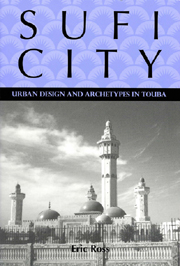Book contents
- Frontmatter
- Contents
- List of Illustrations
- List of Appendixes
- Acknowledgments
- Note on Translation, Spelling, and Transliteration
- Introduction
- 1 Archetypes: Sufi Phenomenology and the Semiosis of Landscape
- 2 Urban Design: The Spatial Configuration of a Spiritual Project
- 3 Marabout Republics Then and Now: Autonomous Muslim Towns in Senegal
- 4 The Pénc: Trees and Urban Design in West Africa
- Conclusion
- Appendix 1
- Appendix 2
- Appendix 3
- Appendix 4
- Appendix 5
- Appendix 6
- Appendix 7
- Notes
- Bibliography
- Index
- Rochester studies in African History and the Diaspora
3 - Marabout Republics Then and Now: Autonomous Muslim Towns in Senegal
Published online by Cambridge University Press: 12 September 2012
- Frontmatter
- Contents
- List of Illustrations
- List of Appendixes
- Acknowledgments
- Note on Translation, Spelling, and Transliteration
- Introduction
- 1 Archetypes: Sufi Phenomenology and the Semiosis of Landscape
- 2 Urban Design: The Spatial Configuration of a Spiritual Project
- 3 Marabout Republics Then and Now: Autonomous Muslim Towns in Senegal
- 4 The Pénc: Trees and Urban Design in West Africa
- Conclusion
- Appendix 1
- Appendix 2
- Appendix 3
- Appendix 4
- Appendix 5
- Appendix 6
- Appendix 7
- Notes
- Bibliography
- Index
- Rochester studies in African History and the Diaspora
Summary
Touba has not emerged in the Senegalese landscape alone. It is the largest and most spectacular node in a network of Sufi towns and centers, and it marks the leading edge of a long and dynamic process of Muslim urban practices in that country. Moreover, Senegal has a long-established practice of autonomous Muslim towns. The aim of this third chapter is to situate Touba within this broader context and to argue that Senegal's modern network of Sufi towns represents an alternative form of urbanization, one based on the initiatives of civil society rather than on those of the state.
Several issues will be raised in turn. First, what constitutes a city? Historically, Senegambia is not recognized as an urban region, or else urbanization is seen as mostly a foreign, European, and colonial phenomenon. How can the history of Islamic institutions in Senegambia be placed in an urban perspective? Second, how can a Sufi institution like the ṯarîqah contribute to urbanization and to the emergence of urban networks in particular? Third, what is the significance of the autonomous status, de facto and de jure, of several of Senegal's contemporary Sufi cities? Can this form of governance be explained from the historical precedence?
What Is a City?
Touba is by far the largest and most dynamic of Senegal's modern Sufi cities. With about 500,000 inhabitants, Touba-Mbacké is the country's second largest urban agglomeration—after Dakar (estimated population 2,476,400 in 2003).
- Type
- Chapter
- Information
- Sufi CityUrban Design and Archetypes in Touba, pp. 117 - 175Publisher: Boydell & BrewerPrint publication year: 2006



